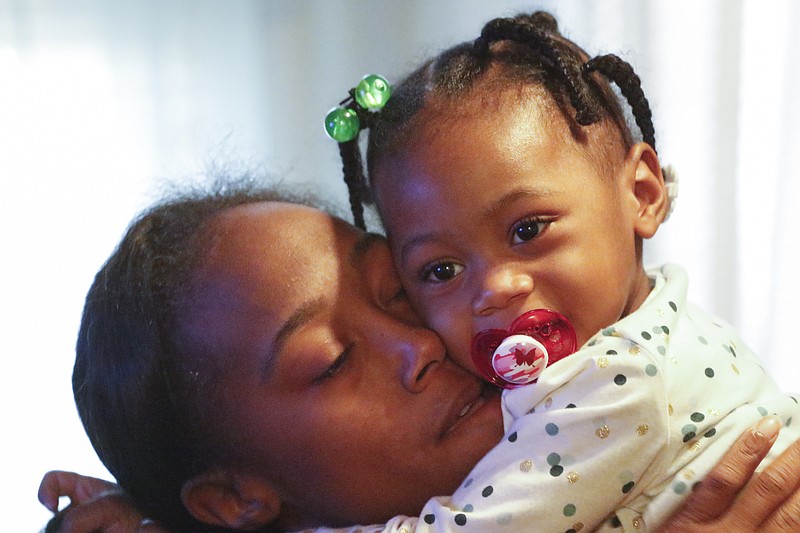Bianca Horton, the mother who police say was murdered after testifying against a man they believe shot and paralyzed her then-1-year-old daughter, was laid to rest Friday, but investigators, scrambling to make an arrest in the high-profile case, say the question of motive remains unanswered.
Mayor Andy Berke, who spoke at Horton's funeral at Olivet Baptist Church on Friday, said he's felt a mix of anger and despair since hearing of Horton's death and told the crowd of mourners the city needs more people to be strong in the face of fear, like Horton was. Curbing inner-city violence has been among Berke's top priorities since he took office.
"There is strength in numbers and the more people who speak out the better off we all are," Berke said. "Four kids in our community lost their mother. That is crushing. Our only choice is to push back and to work harder than ever and to dedicate ourselves to the memory of Bianca."
Horton's body was found on the side of the road near Missionary Ridge on May 25, less than two years after a man opened fire in her apartment in College Hill Courts. Horton and her young daughter, Zoey Duncan, were wounded along with an 18-year-old, and 20-year-old Talitha Bowman died.
The shooting suspect, validated gang member Cortez Sims, was 17 at the time and initially evaded police. After a manhunt, Sims was arrested a few days later in Knoxville after being put on the Tennessee Bureau of Investigation's Top 10 Most Wanted list.
In March of that year, Juvenile Court Judge Rob Philyaw said Sims would be tried as an adult in Hamilton County Criminal Court and, a year later, attorneys agreed to a trial date of Sept. 27, 2016, in Judge Barry Steelman's courtroom.
Also read
Cook: Bianca Horton and the valley of the shadow of death
A spokesperson for the Hamilton County District Attorney's Office said Horton had testified against Sims, but would not say whether she had intended to cooperate in the upcoming trial.
For years, police have been unable to secure witnesses for important cases involving gang members because many inner-city residents claim retaliatory violence is real and refuse to testify in court. Police, on the other hand, have long argued that witnesses aren't in danger and that there is little to no proof retaliation is a widespread problem.
Still, the timing of Horton's slaying has led many in the police department and in the wider community to believe the 26-year-old was killed for choosing to testify. As police continue to follow leads, city officials say they are beefing up police support for victims and witnesses in criminal cases.
This summer, thanks to a grant from the U.S. Department of Justice, the police department will hire two full-time advocates who will help victims navigate the court system and ensure fair treatment as their cases progress. The police department was one of only three awarded the funding.
Caroline Huffaker, the police department's newly hired victim services coordinator, will oversee the program. She said police are partnering with the University of Tennessee at Chattanooga and Southern Adventist University, to track and report data on its impact.
Huffaker said the funding also allows for focus group research and community surveys that she believes will help the police department learn more about how specific subgroups view and interact with officers. That knowledge will also show the department where and how it needs to improve when it comes to victim response, she said.
"If victims feel supported and are aware of their rights, we hope they will continue to engage in the criminal justice process. I want them to feel like they are being treated with dignity and respect," Huffaker said. "It helps our partners in law enforcement achieve their goal of holding offenders accountable."
The challenge, she said, is that many victims have high expectations of the system and often feel let down when all is said and done. Convictions require evidence beyond a reasonable doubt, which is an exceptionally hard bar to clear. An arrest, on the other hand, requires only probable cause.
"It's not because we don't want to do our jobs," said Huffaker, explaining why many cases go unresolved.
Many simply don't understand how the system works, she added.
In addition to enhancing victim services, the police department is also launching a Witness Protection Safety Fund, which will be administered by the mayor-appointed Safety Coalition and is intended to help witnesses in situations where their safety might be at risk. However, the specifics of who and what can be funded are still being ironed out, said Kyle Miller, spokesman for the Chattanooga Police Department.
Yet, the fund should not be considered a witness protection program, Miller said. Tennessee does not fund a witness protection program, but witnesses in federal cases can apply for federal witness protection in Tennessee.
Staff writer Emmett Gienapp contributed to this report.
Contact staff writer Joan Garrett McClane at jmcclane@timesfreepress.com or 423-757-6601.
